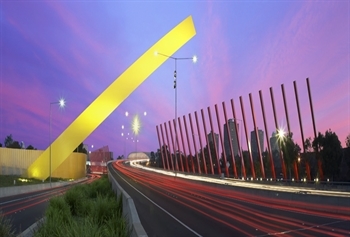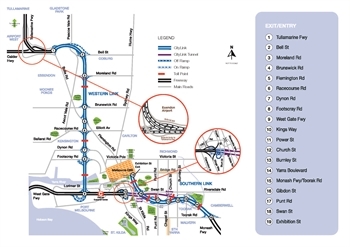

Melbourne, Australia’s tollway is fully electronic.

Photo by Steve Brown (Flickr).
By the early 1990s Melbourne, Australia, had reached its limit with traffic congestion. Highways terminated on the fringes of the city, causing gridlock on residential and urban streets that were handling traffic up to 80 percent greater than capacity. With no alternative routes, freight trucks had to travel through the central business district, exacerbating congestion. Traffic had become so severe it was harming the city’s social, environmental and economic well-being.
With the help of the private sector, CityLink solved Melbourne’s traffic congestion problem. Opened in 2000, CityLink is a 13-mile electronic toll road that links three major highways around the city. It was built over four years and cost $2.1 billion, with $1.8 billion financed by a private consortium and $266 million by the state.
The CityLink project reduced traffic congestion in Melbourne by building two links that bypass the central area and connect three highways to the north, south and west. You will not find a single toll booth on CityLink. It is one of the world's first fully electronic toll roads, allowing drivers to use the system without slowing or stopping to pay tolls and maintain a steady flow of traffic. CityLink processes more than 720,000 tolls every day.

Photo by Mugley (Flickr).
As intended, CityLink has achieved a range of social, economic and environmental benefits, from facilitating traffic movement around downtown Melbourne, to improving vehicle access to the downtown, port, airport and rail facilities, to enhancing the environment around the Yarra River. It has reduced average travel times by 10 to 20 minutes, resulting in $187 million in travel time savings. Some of its other economic benefits include:
- Creation of 6,000 to 8,000 jobs, during the construction phase.
- Efficient movement of vehicles, which lowers maintenance costs by more than $3 million per year.
- Freight savings of $50 million per year.
- Fewer accidents, saving approximately $13 million per year.
- Industrial benefits, such as increasing the efficiency of warehouse operations, improving links between industrial zones, and creating more flexible labor markets, which exceed $40 million per year.
- Enhanced property values of $25 to $30 million.
The environmental benefits of CityLink include more than two million trees, plants and shrubs that were planted along the toll road and its new bike and pedestrian paths.
CityLink has changed the lifestyle and landscape of Melbourne, setting a benchmark for public-private partnerships to deliver vital infrastructure projects. It is a valuable model for the Chicago region, as we tackle our own congestion problems.
NEWS
Local News
Garrett's transit IG bill passes Senate – Chicago Sun-Times “The legislation subjects the RTA, Metra, Chicago Transit Authority and Pace suburban bus system to the authority of the state's executive inspector general.”
Ill. House votes to limit free rides for elderly – Bloomberg “The Illinois House voted 95-15 on Sunday to limit the free service to poor senior citizens. Only people enrolled in the Circuit Breaker aid program would qualify for free rides.”
CTA unveils Train Tracker – Chicago Sun-Times “Found at transitchicago.com and available for smart phones, Train Tracker estimates when the next train will arrive by calculating signal information and the typical time it takes for a train to cover a portion of track.”
City exploring slimmer, trimmer roads – Chicago Tribune “With that additional girth, traffic-related dangers have expanded, too, especially for pedestrians and transit riders trying to cross busy streets and bicyclists sharing the road with cars and trucks. Sidewalks, meanwhile, often have been narrowed to accommodate more traffic lanes.”
CTA cameras to keep an eye on your safety – CBS Chicago “The CTA will install more security cameras in almost all of its trains now in service. This spring, it plans to equip half of its rail car fleet, and if all goes well, the rest of the trains could get the cameras later in the year.”
CTA ridership down less than 1% in 2010 – CTA Tattler “Despite a wretched economy and big service cuts, ridership on the Chicago Transit Authority dropped just under 1% last year compared to 2009.”
CTA considers closing stops on north lines – WBEZ91.5 “The Chicago Transit Authority is considering several options for how to modernize its century-old Red and Purple Lines on Chicago’s North Side and in Evanston, and this week officials revealed that some of those options would involve closing stations. In their stead, new entrances would be added to nearby stations. “You would still have a station that would serve that area,” said CTA spokesman Sheila Gregory. “It would just be sort of reconfigured for modern times.” Gregory said having fewer stations could reduce travel times.
National News
Household Deficit Reduction: Transit Saves People Almost $10K a Year – Streetsblog Capitol Hill “With gas prices at their highest level since October 2008, the American Public Transportation Association’s monthly Transit Savings Report estimates that transit riders save, on average, $9,656 a year.”
Last diesel bus retired by MTA Los Angeles – examiner.com Los Angeles “The Los Angeles County public transportation system leads the way on the utilization of alternative fuel sources. The retirement of the last diesel bus makes LA the only major city in the nation that exclusively uses alternative fuel.”
Federal spending impasse holding up bus rapid transit project – aspendailynews.com “With federal money contingent on the Roaring Fork Transportation Authority’s planned “bus rapid transit project,” there is nothing rapid about getting the new system funded and constructed. That’s because the project could be delayed by Congress’ lack of action on federal spending bills.”
U.S. Can Reduce Transportation GHG by 65%, report says – Environmental Leader “Policy actions recommended in the high mitigation scenario include congestion pricing, greater control of land use, aggressive fuel economy standards for highway vehicles and commercial aircraft, and the federal government committing to an aggressive goal for economy-wide GHG emissions, such as 80 percent below 2005 levels by 2050.”
Bay Bridge travel time reduced in morning rush hour since congestion tolls added – Contra Costa Times “Motorists driving into San Francisco during the morning rush hour are getting onto the Bay Bridge four minutes faster since July, when a higher toll was imposed during the busiest times, according to a report made Wednesday to bridge operators.”
Feds want pilot programs to address congestion problems – CivSource “The federal Department of Transportation and the Federal Highway Administration is looking for a few good pilot programs that could help address the nation’s $60+ billion congestion problem, providing a grant of $10.5m for a Value Pricing Pilot (VPP) program.”
NJ and VA governors reveal transportation funding plans; Reports examine congestion pricing, public-private partnerships – The Council of State Governments “As other states seek ways to finance improvements to their own transportation systems, a number of recent reports and developments put the focus on such mechanisms as public-private partnerships, congestion pricing and tolling.”
Feds grand $25M for downtown light rail – The Detroit News “The funds are to be used for road rehabilitation, landscaping and the purchase of light rail cars for the project.”
County’s new plan could replace road impact fees with higher fees – The Gainesville Sun “For future development, [Alachua County] would do away with transportation impact fees levied on new development to fund road projects and replace them with more expensive "multi-modal mitigation" fees, which would fund construction of roads, bicycle and pedestrian paths, and a proposed bus rapid transit system.”
Deadline pressure threatens high-speed rail – The Fresno Bee “California's high-speed rail project has a tight schedule to keep: It must meet a series of deadlines to keep $2.5 billion in federal money. But some experts say the program already is running late.”
Public-private plan will ensure parks’ survival – The Arizona Republic “Arizona's state park system is close to collapse. In recent years, the state has not only cut off all support from the general fund but also raided park revenue…The most promising proposal is to create a quasi-governmental agency to oversee them.
Less fuel also means less revenue – The New York Times “For environmentalists and others eager to reduce reliance on foreign oil, the advent of electric cars and other fuel-efficient vehicles is cause for celebration. Yet for governments, the trend has a distinct downside: their fuel-tax receipts will dwindle, because drivers will buy less gasoline.”
Congestion Pricing: to skip traffic, Atlanta says pay up – Time “This summer the Georgia Department of Transportation will complete the construction of a so-called high-occupancy toll lane. It will run 16 miles just north of the city along Atlanta's heavily trafficked I-85, and allow drivers to pay to avoid traffic.”
Green transportation projects moving forward in Florida, Detroit – Streetsblog “Transit Miami reports that the state has committed $118 million for the construction of an Amtrak connection running down the Atlantic coast of Florida…The Motor City is looking to remedy its car-centric ways with the new “Detroit Works” project, a blueprint for the city’s transformation.”
More mass transit agencies consider selling station naming rights – SmartPlanet.com “Caught in a budget squeeze as cash-strapped cities withhold funding, many mass transit authorities are turning to selling naming rights for stations to corporate sponsors. In November, the Chicago Transit Authority announced it was selling station naming rights to prospective sponsors. How about the Apple Lincoln Park Station? Not a reality yet, but Apple recently provided $4 million to renovate the authority’s formerly dilapidated Lincoln Park station near a new store.”
World News
PPP has never been more necessary – The Australian “The Public Private Partnership model or, more accurately, private sector participation in infrastructure projects, has been much maligned. In fact, PPPs have proven to be more cost-effective than traditional models in their ability to enable the delivery of infrastructure on time and on budget. Australia will need large amounts of both public and private investment to rectify our infrastructure deficit.”
Establishing standards to Improve BRT systems in Latin America – EMBARQ Network “By sharing a common set of standards, case studies and best practices, SIBRT aims to help improve transit systems across Latin America, dealing with challenges like overcrowding and fare evasion, the encroachment of bus lanes by general traffic, or slow bus speeds.”
Egypt establishes new fund to finance public-private partnership projects – Al-Masry Al-Youm “The Egyptian government on Thursday announced the establishment of a US$5-billion fund to finance partnership projects with the private sector.”
Government to court private and foreign investors to help build cities – The Economic Times “India will reach out to private and foreign investors to help build its rapidly expanding cities through public-private partnerships (PPPs), the newly appointed minister for urban development said on Thursday.”
National Infrastructure Summit kicks off in Regina – Ottawa Citizen “REGINA — Mayors of some of Canada's largest cities took centre stage on Wednesday during the National Infrastructure Summit (NIS) in Regina. Mayor Pat Fiacco, summit host, has been calling attention to the infrastructure issue for years and has been the driving force behind gathering 350 delegates from municipalities large and small across Canada, as well as from the private sector, for the three-day convention.
 | ||||
Talking Transit is sponsored by  | ||||
Upcoming events
|
||||
|
Tell us what you think of Talking Transit. Email talkingtransit@metroplanning.org with feedback in the subject. To subscribe, visit our website at metroplanning.org/signup.html. To stop receiving this newsletter visit metroplanning.org/unsubscribe.html? |
Email design by Webitects
Metropolitan Planning Council | 140 S Dearborn St | Suite 1400 | Chicago, IL 60603Phone (312) 922-5616 phone | (312) 922-5619 fax | talkingtransit@metroplanning.org
Copyright © 2026 Metropolitan Planning Council. All rights reserved.
To stop receiving this newsletter visit metroplanning.org/unsubscribe.html?EmailMsgId=110&email=
